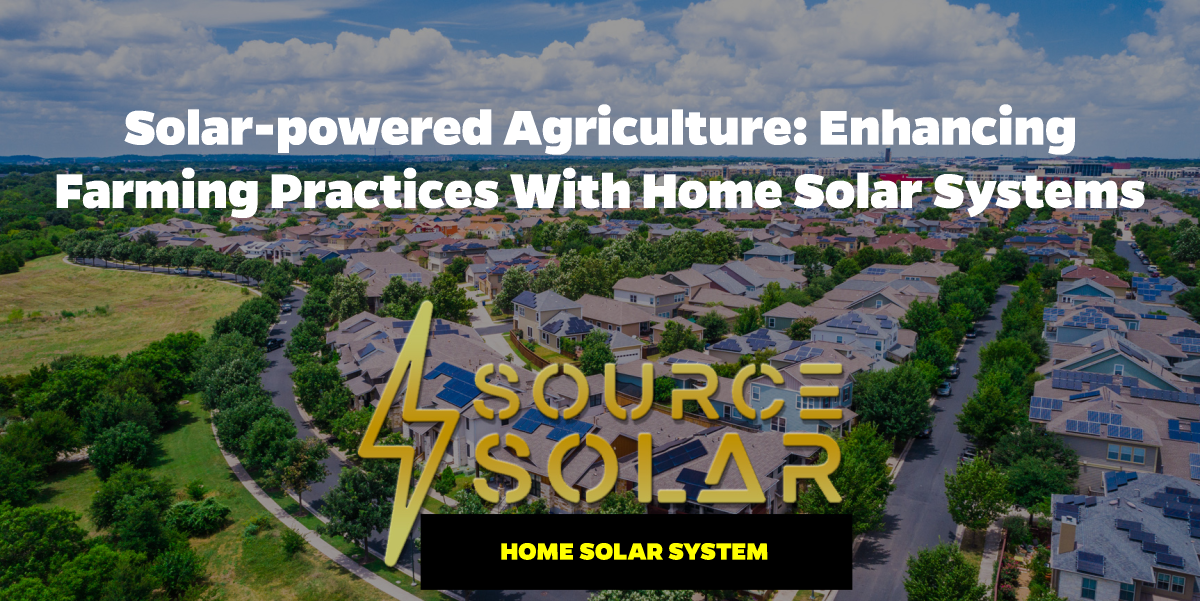Introduction to Solar-Powered Agriculture
We are living in an era that desperately screams for sustainable strategies and technologies. Amongst the numerous ways to create a more sustainable future, solar power, a renewable source of energy, stands out. Particularly for the agricultural sector, solar power has the potential to revolutionize farming practices. At the heart of this energy revolution is the Home Solar System. As Iowa City’s Source Solar, a top-rated solar company, we firmly believe that harnessing the power of the sun can enhance farming practices significantly.
Need for Solar Power in Agriculture
Traditionally, the agricultural sector has been one of the largest users of energy. From irrigating fields to powering machinery, energy consumption is high and costs can be immense. However, many of these processes can benefit from solar power systems, reducing dependence on fossil fuels and reducing operational costs.
The demand for energy in farming is not static; it varies according to seasonal and production fluctuations. This unpredictability makes the sector vulnerable to energy price hikes. However, with a Home Solar System, farmers can generate their power, significantly decreasing their vulnerability to market fluctuations.
The Power of the Sun in Agriculture
Solar power offers immense benefits to the agriculture sector. First, it’s an abundant, clean, and renewable source of energy. Unlike fossil fuels, which emit harmful greenhouse gases contributing to climate change, solar-powered systems generate electricity without causing environmental harm.
Secondly, solar power can enhance farmers’ resilience against unpredictable climatic changes, shifts in energy prices, and other disturbances. With a Home Solar System, farmers can weather these uncertainties more effectively, promoting the sustainability of their farming operations.
The Role of a Home Solar System
To put it simply, a Home Solar System is a small-scale solar power generator, designed for individual or small community use. These systems work by harnessing the sun’s rays using solar panels, which then turn this energy into electricity.
By investing in a Home Solar System, farmers can power their homes and farm operations. This means farmers can enjoy electricity for lighting, appliances, tools, and other essential farm operations. Plus, any excess energy generated by the system can be sold back to the grid, creating an additional source of income.
The Home Solar System is cost-effective over time. The initial investment, which entails purchasing and installing the solar panels, is usually recovered in a few years through the savings made on energy bills. Afterwards, the system can offer free power to farmers to run their operations more sustainably and profitably.
Practical Uses of Solar Power in Farming
There are many practical uses for solar power in agriculture. One of the primary uses is irrigation, where solar-powered pumps are used to extract and distribute water. Other uses include solar-powered machinery and equipment, solar drying for crops and grains, and heating farm buildings.
In many ways, the Home Solar System can transform traditional farming practices, bringing in greater efficiency, productivity and sustainability. For livestock farmers, solar-powered water heaters can also provide a constant supply of warm water, essential for maintaining animal health.
Conclusion: Embracing Solar-Powered Agriculture
While there can be a learning curve involved with integrating solar power systems into farming practices, the benefits that these bring – both in terms of reducing costs and reducing environmental impact – are considerable.
At Source Solar, we’ve helped numerous farmers in Iowa City transition towards solar power. We believe that solar energy, especially through the Home Solar System, is the key to a sustainable farming future. It’s an investment in sustainable agriculture, and a commitment towards preserving our planet for future generations. Embracing solar power today, is embracing a green, brighter, and more sustainable future for agriculture.









